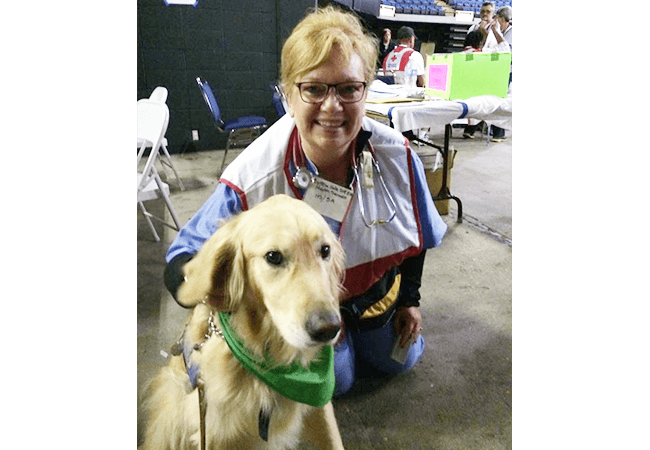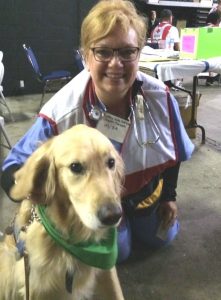
Aug 25, 2016
When Disaster Calls, Nurses Respond
At least one nurse reading the call from the Red Cross for nurses to help in Louisiana answered immediately: For Cindy Holle, RN, DNP, Tuesday, August 23, was Day Two volunteering for those desperately in need after the flooding that started August 12.
Holle was busy even before the disaster hit. Last Thursday, she earned her Doctorate of Nursing Practice degree at MGH Institute of Health Professions; the next day the American Red Cross Disaster Health Services approved her for a two-week stint volunteering. Holle also serves on the Advisory Committee of the Connecticut Nursing Collaborative-Action Coalition.
What does a nurse do when helping hundreds who have lost their homes and everything inside? Whatever is needed that day—or to be exact, that minute.
 Notes that Holle has scribbled during long days reflect bursts of action on many fronts. The main weapon she and the others wield is the ability to solve problems. The disaster relief workers have access to walkers, wheelchairs, and over-the-counter medicines, and can help people get refills for prescriptions and transportation to pick up those medicines. Trying to fill in those gaps left in people’s lives is only part of the story. Everyone has a different need, and such a flood hits people in unexpected ways. On learning that someone living in the shelter in which Holle worked had returned to his apartment only to find his possessions tattered and in the street—he retrieved only a family photo—Holle did what she could. She held his hand; she said, “I’m sorry. I’m thankful you survived, I’m honored to be here with you.”
Notes that Holle has scribbled during long days reflect bursts of action on many fronts. The main weapon she and the others wield is the ability to solve problems. The disaster relief workers have access to walkers, wheelchairs, and over-the-counter medicines, and can help people get refills for prescriptions and transportation to pick up those medicines. Trying to fill in those gaps left in people’s lives is only part of the story. Everyone has a different need, and such a flood hits people in unexpected ways. On learning that someone living in the shelter in which Holle worked had returned to his apartment only to find his possessions tattered and in the street—he retrieved only a family photo—Holle did what she could. She held his hand; she said, “I’m sorry. I’m thankful you survived, I’m honored to be here with you.”
Disaster Relief Fund for Louisiana Nurses
Louisiana nurses, of course, are on the front lines providing care to those in need, much as they did during Hurricane Katrina in 2005. Even as many have been directly hit by the most recent flood to ravage the state, they are sacrificing their personal needs to look after the health of others. Cynthia Bienemy, PhD, RN, director of the Louisiana Nursing Center, and co-lead of the Louisiana Action Coalition, says that Louisiana is deeply grateful to Holle and others who are helping. To those who want to help but cannot fly in, Bienemy suggests the disaster relief fund for Louisiana nurses, established by the Louisiana State Nurses Association and the Louisiana Nurses Foundation, whose monies will go to nurses and their families who face the same needs their neighbors do.
Adds Bienemy: “Everyone is helping everyone, truly a beautiful sight in the midst of such tragedy.”
The storm, in a way, led Holle in the direction her studies had already taken her. For more than a year before she flew south, Holle has been on the Population Health Work Group run by the Connecticut Nursing Collaborative-Action Coalition. The work group is expanding ways nurses and others think of health, and creating courses that can be completed online that cover new ways to create healthy communities. That means that Holle spent months considering what constitutes “good health” besides not being sick, and figuring out ways to teach others those concepts. Now she and others answering the call from the American Red Cross are putting those concepts into practice amid people seeking basics such as food and shelter.
As Holle put it in one of her notes: “This type of nursing is unique. Or perhaps, very old and foundational. We assess, plan, and treat.”
And when needed, work with National Guardsman, physicians, psychologists, social workers, religious leaders, disaster relief specialists, housing experts, and even comfort dogs to do what’s best for those in need.
Above: Holle with Noah, a comfort dog, during relief efforts in Baton Rouge. Holle says what nurses and others perform–and see around them–are “random acts of kindness and thoughtfulness.”
